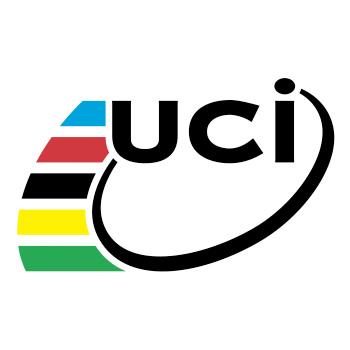- News
- Reviews
- Bikes
- Components
- Bar tape & grips
- Bottom brackets
- Brake & gear cables
- Brake & STI levers
- Brake pads & spares
- Brakes
- Cassettes & freewheels
- Chains
- Chainsets & chainrings
- Derailleurs - front
- Derailleurs - rear
- Forks
- Gear levers & shifters
- Groupsets
- Handlebars & extensions
- Headsets
- Hubs
- Inner tubes
- Pedals
- Quick releases & skewers
- Saddles
- Seatposts
- Stems
- Wheels
- Tyres
- Tubeless valves
- Accessories
- Accessories - misc
- Computer mounts
- Bags
- Bar ends
- Bike bags & cases
- Bottle cages
- Bottles
- Cameras
- Car racks
- Child seats
- Computers
- Glasses
- GPS units
- Helmets
- Lights - front
- Lights - rear
- Lights - sets
- Locks
- Mirrors
- Mudguards
- Racks
- Pumps & CO2 inflators
- Puncture kits
- Reflectives
- Smart watches
- Stands and racks
- Trailers
- Clothing
- Health, fitness and nutrition
- Tools and workshop
- Miscellaneous
- Buyers Guides
- Features
- Forum
- Recommends
- Podcast
news
 UCI logo on white
UCI logo on whiteUCI to continue phasing out of two-way radios following meeting with team managers
Pat McQuaid, president of the UCI, has today met with representatives of the sport’s leading teams as world cycling’s governing body presses ahead with its plans to progressively phase out the use of race radios.
The issue has been the subject of increasing tension recently, coming to a head in last month’s Mallorca Challenge when the UCI annulled the first day’s result due to the start of the race being delayed as teams protested about the imposition of a radio ban on the event.
The UCI's view is that banning two-way communication between riders and team personnel will lead to more spontaneous and exciting racing, while the teams maintain that it would be a retrograde step to dispense with the technology and above all that such a move would jeapordise rider safety. A compromise solution - that riders could remain in touch with their team staff, with communication allowed in safety-related situations only - dos not appear to be in th offing.
The protest in Mallorca was led by the Association Internationale des Groupes Cyclistes Professionnels (AIGCP – International Association of Professional Cycling Groups), three of whose members, all team managers – Rabobank’s Harold Knebel, Quick Step’s Patrick Lefevre and Bjarne Riis of Saxo Bank-SunGard – met with McQuaid today at the UCI’s offices in Aigle, Switzerland.
In a statement, the UCI said that the meeting had been “organised at the request of team representatives and welcomed by the UCI President in line with the UCI’s wish for open dialogue with all of its partners,” adding that “the subject of the discussion, which took place in a calm and constructive atmosphere, was the progressive banning of earpieces during road races."
McQuaid told the AIGCP representatives that the UCI would consider the points raised, and specifically those regarding the safety of riders, with th UCI undertaking to “communicate with organisers and commissaries immediately to ensure the safety aspects are given the highest priority.”
However, the UCI added that the progressive phasing out of two-way radios “will go forward as planned” although it has now said that “the situation will be evaluated on an ongoing basis,” as requested by the AIGCP.
The organisation's stance over the proposed radio ban is in part a reflection of a power struggle betwen it and the UCI rgarding what the teams perceive as a lack of consultation in key decisions affecting the sport, but in today's statement, the UCI said that “Mr McQuaid also emphasised that recent claims made by the AIGCP regarding representation within the cycling family are not at all justified.”
Some of those criticisms had been aired on Twitter by Garmin-Cervelo’s Jonathan Vaughters, president of the AIGCP, on the same day as the protest in Mallorca, which had been preceded by the reading out of a statement issued by the organisation.
On Twitter, Vaughters had said: “To be clear, radio ban protests are not only about the radio ban. Teams and riders must have greater participation in governance of cycling,” adding, “Our licensing fees and bio-pass contributions to the UCI are massive. We must be represented. ‘No taxation w/o representation.’ Patrick Henry,” the latter being a famous opponent of taxes imposed by Britain on the American colonies.
Today, however, the UCI insisted: “Two elected members of this association sit on the Professional Cycling Council (PCC), whose mission is to discuss all the problems facing the professional sector, including the above, as well as propose better strategies and procedures to help resolve them.”
Not every freehub makes a noise, especially older ones manufactured before sounding like a Maxim gun apparently became a badge of honour.
Some quotes need to be put around the word "reciprocal" in the first paragraph.
this one is wide open for puns, come on people.
Do you mean this woman, who got out to marshall the truck through and is now walking back to said Wankpanzer which is blocking the road again as it...
This simply isn't true. I've been running radar lights for 10 years now. I cycle mostly on rural roads, I get notified of approaching vehicles up...
YUP!...
Genuinely puzzled as to how you've extrapolated that from what I said. Care to explain?
He is up against the global trading system, which has obviously been in the news a lot lately. Framebuilders in other countries can undercut him,...
Some kind of lens cleaner apparently
Have you owned Bont shoes? In my experience even the widest Lake shoes have had a bizarre form of narrowing way too much in the toe area. But the...